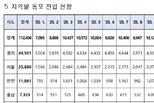
Newsnomics AJAY ANGELINA reporter |
South Korea’s extramarital births setting a new record high accounted for nearly 5 percent of all births last
year, while the total number of newborns dropped to a new low show the data released on Thursday.
On Thursday, According to Statistics Korea, about 230,028 babies born last year, 10,900, or 4.7 percent, were
born to women who were not married, marking the highest proportion since records began in 1981 according to the Statistics Korea
Since 2020, the extramarital Babies birth have steadily been increased to 9,800 in 2022 that is 3.9 percent of total births. The year 2021 counts the figure to 7,700, or 2.9 percent.
In contrary to the increased extramarital births, the total number of births has been declining since 1960s and 1970s. During one peak in 1971, the total number of babies born was 1,024,773 that is 4.54 children born per woman aged between 15-49 designating the low birth rate measures.
Last year, the number of babies birth dropped to 230,028 shows a 7.7 percent decrease from 249,200 in 2022, marking the lowest figure since the agency began collecting data in 1970.
In 2020, the nation faced annual number of childbirths fall below 300,000 marked lowest for the first time
ever.
South Korean fertility rate also dipped to a fresh low of 0.72 last year from 0.78 the previous year. Seoul had
the lowest fertility rate at 0.55, followed by Busan at 0.66. However, South Jeolla Province and Sejong City recorded the highest fertility rates of 0.97.
South Korea saw a total of 193,673 marriages registered last year, up from the 191,690 marriages recorded in 2022.
Among the newborns last year, first children accounted for 60.2 percent, up 2 percentage points from 2022. While the proportion of second children comprised 32.3 percent, down 1.4 percentage points, while third children made up 7.5 percent.
Among the newborns, 60.2 percent were a couple's first child in 2023, up 2 percentage points from a year
earlier, while the proportion of a second child fell 1.4 percentage points to 32.3 percent, the data showed.
The average ages of mothers 33.6 and of fathers was counted 36.1 as per last, both increasing by 0.1 from the previous year the data showed.
South Korea has the world’s lowest fertility rate that will drop below 0.7 in 2024; Statistics Korea predicts that
the rate will reach 0.68. On the other hand, Korea’s population declined naturally for the fourth year in a row.
Last year’s population decrease of 122,800 was 1,000 fewer than the previous year, but continues a population decline that began in 2020.
“We are projecting that this year’s birth rate will decrease from 2023 to 0.68. But given the increase in
marriages, the rate could rebound next year or the year after that,” said Lim Young-il, the chief of the population trends section at Statistics Korea.










